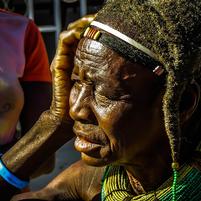In June the Commonwealth Heads of Government (CHOGM) will meet in Kigali the capital of Rwanda . They have chosen ‘youth’ as their theme.
Despite its ferocity the Rwandan genocide remains a closed book to many outside central and East Africa. While the UN dithered and major global newspapers failed to despatch reporters to cover the carnage, 800,000 people were murdered - often by hand - in a few short months.
Many in London, Paris or Washington DC still refer to the conflict as ‘tribal’, but in reality divisions between the Hutu, Tutsi and Batwa owed less to local habits than to colonial administrative classifications based on the imported ‘science of eugenics’ . Group based pass laws comparable to apartheid South Africa’s had become a social and legal norm. The majority Catholic Church had helped design them, and in the run up to 1994 the Archbishop of Kigali sat on the ruling party’s central committee. Consequently the ageing journey of Rwandans reaching 65 is distinctive, often stressed and – because murder typically rained down on men – highly gendered. In the coming decade Rwanda’s elder population will see an increase of 300% in its over 60’s.
My research team interviewed 152 people in three localities and undertook a series of ethnographic observation walks using a tool developed by the NGO Tearfund who, with the Elise Pilkington Trust and America’s Life.Church, made the project possible.
Older people were almost entirely absent from the public sphere. Although they are perceived to be ‘wise’ and have a huge yearning to retain agency, they lack a political voice. Their lives are very hard. Water can sometimes be a two hour walk away and ‘be the colour of a strong tea’. Food is scarce, health insurance expensive (not least because until very recently the government has required families to pay personal premiums for all members before any individual could be covered). Access to social assistance is complicated by multiple categorisations of need and desert. Indeed, the conflation of ‘tiredness’, ‘age’, ‘ill health’, ‘disability’ and frailty in language, local custom, under-skilled observation and via local community tensions and politics can leave even the most vulnerable elders unsupported.
Local interactions are affected not only by the traditional challenges of the life course, ‘biographical pain’ and poverty, but also by the legacy and memory of their ‘genocide history’. Those released from prison after having been complicit in aiding and abetting genocide live in villages side by side with those whose struggles with their livelihood or ill-health (often without access to medicines) are compounded by the loss of loved ones as victims of the violence. Heads of household are extremely often frail elders without income caring for traumatised adult children and extended family members who cannot work. The levels of vulnerability most often mean that as household sizes grow the usual economies of scale do not enter in.
Our findings resonate with some other African contexts. However, cutting across all these patterns are at least four specific strategic themes.
- Opportunities for social institutions: Churches and the state played such large parts in the trauma of 1994 that their ability to regain trust, make positive contributions and deliver improvements is a distinctive indicator of the health of post - conflict Rwandan society. The social programmes of Protestant churches supported by Tearfund in Rwanda have in excess of a million beneficiaries working on community empowerment, savings and inclusion. The Rwandan state has made exceptional social policy progress but half the country remains uncovered by health or social protection and pension coverage runs well short of 10% of the population. Where striking improvement has been secured in reducing child mortality by mass community mobilisation, the relevance of shorthand assumptions about the replacement of old ‘carescapes’ by ‘modern’ policy interventions to the lives of older people may not be obvious. There is work to be done to mainstream ageing and the elderly in the lives and leadership of these crucial social institutions and mobilisation efforts.
- Facing Severe Mental Health: Estimates of PTSD in Rwanda run between 40 and 57% of the population. Attempts at ‘life review’ in old age can (re-)trigger loss. Psychotic episodes among our older interviewees were evident. There is just one psychiatric unit for the entire country, and this, we were told, faces intense stigma. Psychological support beyond the capital is rare despite best efforts. The majority of national ‘mental health’ spend is oriented not in these directions but towards epilepsy and disorders. The bulk of all health funding is targeted, with WHO guidance, on under-60s. DFID and other ODA programmes almost entirely ignore these needs in their work.
- Elder Abuse and safeguarding: Older people reported paying for help to cultivate land that they could no longer tend. After payment those offering assistance would disappear without doing the work. Others angrily and very fearfully reported financial abuse at the hands of clergy and churches. In the poorest localities social pressure to tithe at very high levels to Pentecostal churches, and to give Mass offerings at up to ten times local household income to local Catholic clergy, had caused families to go without food, even to sell their last livestock. Paid carers are a new factor in urban life, but we heard reports about untrained recruits pinching, biting and beating older people in their own homes. Anecdotal evidence suggests this spiritual/financial/care abuse is not exceptional. Gaps in policy and practice on the safeguarding and protection of older adults were discovered for religious organisations and NGOs not only in Rwanda but also more widely within members of BOND and the DEC and other networks from whom local safeguarding policies are adapted or adopted.
- Agency is Deep and Thriving: Despite very significant needs and gaps our interviewees retained agency as mentors, neighbours, and carers. Many worked late in life, all gave to help friends, family and congregation members. A very large number had played a part in civic works, military service and other voluntary contributions. Trust in the Rwandan President is high and a sense of pride and purpose strong in many cases. Our respondents wanted their stories placed centre stage in policy discourses and the lives of churches and other networks.
Ageing in Rwanda presents huge opportunities for creativity, industry and the active design of positive pathways of support and social solidarity. It also presents knotty problems for the public, private, third and faith sectors as they work with more ‘traditional’ success criteria and their institutional constraints. Some of those assumptions point to systemic and grave failings in the work of the development community. Recognising such gaps provides a good basis to do more, and do it better.
As preparations accelerate for CHOGM 2020 new light needs to be shone in such opportunities lest the summit in Kigali embrace ‘youth’ at the expense of those who have earnt the right to be heard if for no reason other than that they were so grievously failed by those beyond their borders before.
Publication:
Ageing in Rwanda : Challenges and Opportunities for Church, State and Nation
About the Author:
Francis Davis is Visiting Professorial Fellow in the Institute on Ageing Population , Professor of Communities and Public Policy at the University of Birmingham and Visiting Professor in Social Justice and Innovation at St Mary’s University Twickenham. Zambian born he has held ministerial advisory roles in the UK government working on religion, race, and disability inclusion and has volunteered with Remembering Srebrenica and the Holocaust Memorial Day Trust.
Opinions of the blogger is their own and not endorsed by the Institute
Comments Welcome: We welcome your comments on this or any of the Institute's blog posts. Please feel free to email comments to be posted on your behalf to administrator@ageing.ox.ac.uk or use the Disqus facility linked below.













